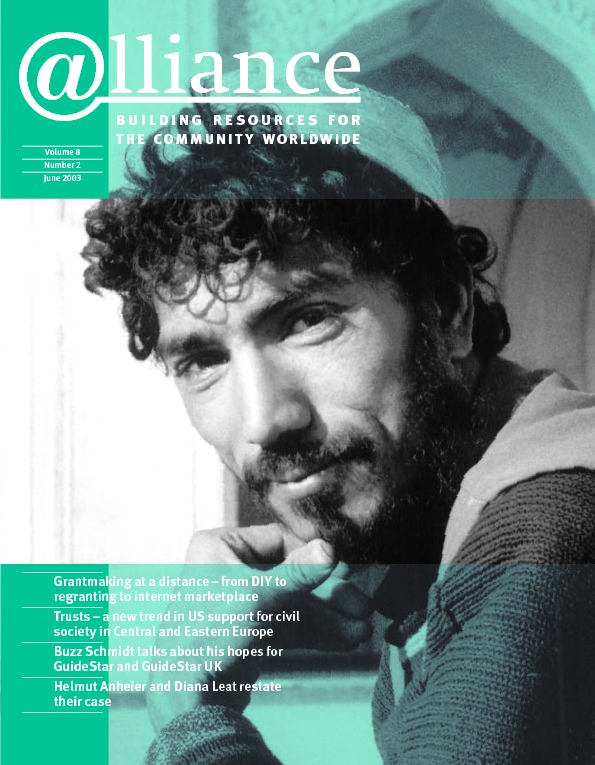As a relatively small private foundation in California, the McConnell Foundation had never discussed the idea of international giving. But World Bank President Jim Wolfensohn’s impassioned plea for all foundations gathered at the Council of Foundations 1998 annual conference to consider undertaking cross-border giving set us talking about our international interests.
But if we were to make overseas grants, where would we make them and how would we start?
Selecting a country
We began by establishing criteria for selecting a country that mirrored our local environment – rural, small-scale, clear needs, where a small amount of money could make a difference. We wanted our international programme to share our domestic focus – women, children, families, education, the environment, sustainability – to take advantage of our existing knowledge. We solicited advice and recommendations from others more experienced in international giving[1] and finally decided to begin a cross-border programme in Nepal.
We made two exploratory trips to Nepal in 2000. We visited large INGOs, small NGOs and possible projects and met with potential funding partners. This led to programme recommendations, which the board approved. The initial budget was small – US$400,000 over three years – 0.8 per cent of our annual payout. As we develop confidence, we are gradually increasing our international grantmaking budget, currently allocating 2.3 per cent of our total budget to cross-border grants.[2]
Developing a programme
The programme design reflects the fact that we are unconstrained by external agendas or political changes; we have no specific goals or programmes we want implemented, but want our Nepali partners to identify the most pressing needs (and solutions); we have no desire to ‘get credit’ for our involvement; we have minimal internal bureaucracy; and we have a supportive board, willing to take reasonable risks, commit for the long term and dedicate substantial staff time. We signed our first funding agreement in 2001 and currently have six ongoing projects: one with a US operating foundation, one with a US regranting foundation and four direct grants to Nepali organizations.
Challenges and concerns
A cross-border giving programme involves various challenges. Below we list some of these and how we attempted to overcome them.
Finding good local partners We talked to other funders and NGOs, visited potential partners and asked who they work with, who their staff are, how ‘clients’ are represented on the board, etc.
Being a good partner What is expected? Which expectations can be met? What do we need to learn to help rather than hinder our partner NGOs’ efforts? We’re still working on this one.
Local community response Funding had previously been limited to the local area[3] and several local citizens voiced strong objections to our new cross-border giving programme, through letters to the local paper, radio call-in shows, etc. We took this as an educational opportunity – making presentations, meeting everyone who voiced a complaint to explain the programme and why we began it. While we didn’t necessarily change people’s minds, they at least had accurate information and our efforts were mostly appreciated.
Sustainability We aim to design programmes that are sustainable once the NGO/funder leaves and try to provide non-monetary assistance that can continue after we’re gone, eg introductions to people with technical expertise.
Inadvertent involvement in local politics We try to maintain good relations with all political parties and develop a wide circle of contacts, colleagues and friends.
Language problems and/or unfamiliarity with the culture Good partners will go to immense lengths to help. Confirming agreements in writing will help eliminate misunderstandings.
Benefits
Having identified and dealt with these challenges and concerns, one must ask whether the benefits of cross-border funding outweigh the challenges. Based on our very limited experience, the answer for us right now is yes. Having found partners that match us well organizationally and share our long-term relationship goals, we can support more programmes than we otherwise could due to lower local operating costs. We can speak with direct knowledge and passion to anyone who asks, and we have the pleasure and rewards of being personally involved.
We would encourage every foundation to consider cross-border giving. It doesn’t have to be a large part of a grantmaking budget nor does it have to be solely financial. You’ll receive tremendous support from your friends and colleagues in the philanthropy world and you’ll be contributing resources that so few have and so many can benefit from.
1 Our staff visited international grantmakers and US-based INGOs, reviewed UN statistics and assessment reports, and met with the World Bank and foreign missions in the US.
2 In-house administration costs account for 11 per cent of the total international budget. This covers two annual visits to Nepal and salary expenses related to the international programme.
3 The Foundation’s local area consists of two small rural mountain counties with a population of 220,000 people.
Karen Bennett is Director of International Programs and Special Projects at the McConnell Foundation. She can be contacted at karen@mcconnellfoundation.org





Comments (0)